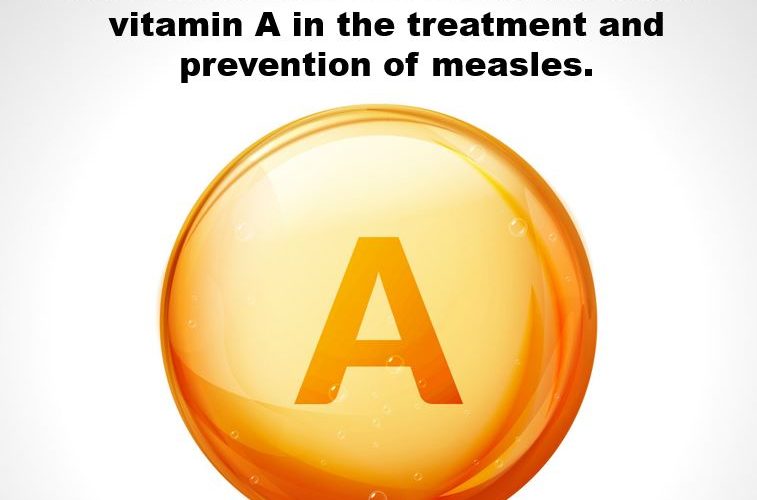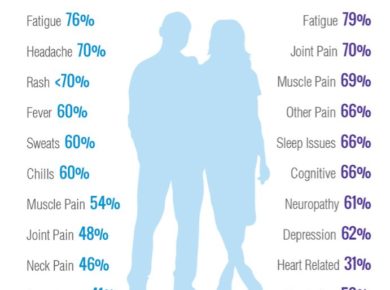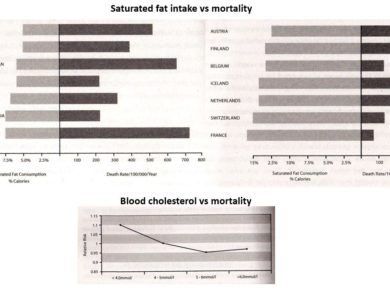We have known for a while that vitamin A is important for a good immune system and
specifically for helping the body fight off the measles virus.
Back in the 1970s, Dr. Alfred Sommer, MD, MHS, and colleagues observed that
children who were being given vitamin A supplements and those who were not deficient,
seemed to have better outcomes if they became ill with infectious diseases like measles
or diarrhea.
No, they were not immune to those diseases, but they fared better. Vitamin A deficient
children died at a higher rate; it seemed.
Then, Dr. Sommer and colleagues conducted some larger clinical trials, in the 1980s
and early 1990s, to figure out what was going on. They found that:
“Their work showed that ensuring adequate vitamin A intake can mitigate the effects of
common diseases such as measles and diarrhea; reduce child mortality in at-risk
populations, by 23 to 34 percent, to avert up to one million deaths a year; and prevent
as many as 400,000 cases of childhood blindness each year.”
As a result, the World Health Organization made vitamin A supplementation for children
all around the world a top priority. Further studies showed that a supplement costing just
2 or 3 cents per dose could prevent thousands of dollars in lost productivity by saving
the lives of children.
Today, vitamin A deficiency is still a problem, especially in developing nations. And it’s
not just vitamin A. Children in developing nations are also deficient in other nutrients,
leaving them vulnerable to all sorts of complications.
There is malnutrition here in the United States , though it is more a result of empty
calories and inner-city food, than structural problems at the national level in the delivery
of food and healthcare.
Let us compare two places in the world where measles is active: Europe and
Madagascar.
Europe, for the most part, consists of several countries deemed to be industrialized and
developed. While there is some variation between countries (and within countries), most
Europeans enjoy a high standard of living. They have access to nutritious food , and
many enjoy the benefits of universal healthcare access . Europeans have also been
contending with a resurgence of measles.
Compare that epidemic in Europe to the one in Madagascar. According to the World
Bank, more than half of Madagascar’s children (5 years of age and younger) are
chronically malnourished . The country as a whole is very poor, with over 90% of the
population living on less than 2 dollars a day.
Madagascar is in the middle of one of the biggest and worst measles epidemics in the
world. With tens of thousands of cases and almost 1,000 deaths, measles has taken out
entire families throughout the country. The estimated mortality rate for measles there is
closer to 15 per 1,000 cases, compared to 1 per 1,000 in industrialized nations.
Malnutrition and lack of access to care is a driving factor behind this situation.
All scientific discoveries come with some level of apprehension, especially if the results
are found to be revolutionary, like Dr. Sommer’s observation that vitamin A
supplementation prevented deaths from infectious diseases. This is why the scientific
method has been developed and refined, helping us confirm these observations and
expand on them. As Dr. Sommer and his colleagues found, vitamin A prevents deaths
from measles and other infectious diseases.
This article gives you more information on this topic:
“Vitamin A treatment of measles” published in 1993 in the journal of American Academy
of Pediatrics.
We know that vitamin A modulates the immune system and is important for its optimal
function.
But wait there’s more! 😊
Some research has come up to explain how vitamin A may play a more important role in
measles prevent.
For example, this paper published in 2013 explains how vitamin A is important for the
development and integrity of the blood-brain barrier (BBB):
“Retinoic acid induces blood-brain barrier development” by Mizee MR, et al.
To sum it up, they show that vitamin A is critical during early development for the
formation and function of the BBB.
Without adequate vitamin A, the BBB becomes “leaky,” allowing the passage and
accumulation of toxins in the brain.
We know the main cause of measles is encephalitis or inflammation of the brain.
This happens when the virus finds its way to the brain.
This paper shows that vitamin A strengthens the barrier which could prevent the virus
from getting to the brain.
It can also potentially prevent any toxins (mercury, aluminum, formaldehyde, etc.) from
entering the brain by maintaining the integrity of the BBB.
Interestingly, it has been hypothesized that the MMR vaccine accelerates the
accumulation of aluminum (from Hep B vaccine) into the brain.
How does this happen? Does this happen only in kids who are vitamin A deficient?
The picture is becoming clearer here. Vitamin A is not only necessary to support a
healthy immune system, but it is also critical for the proper function of the BBB, which is
to prevent the passage of viruses and heavy metals to the brain.






